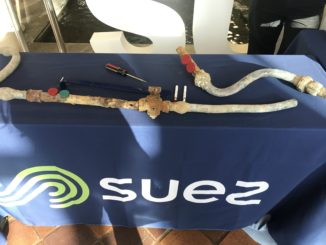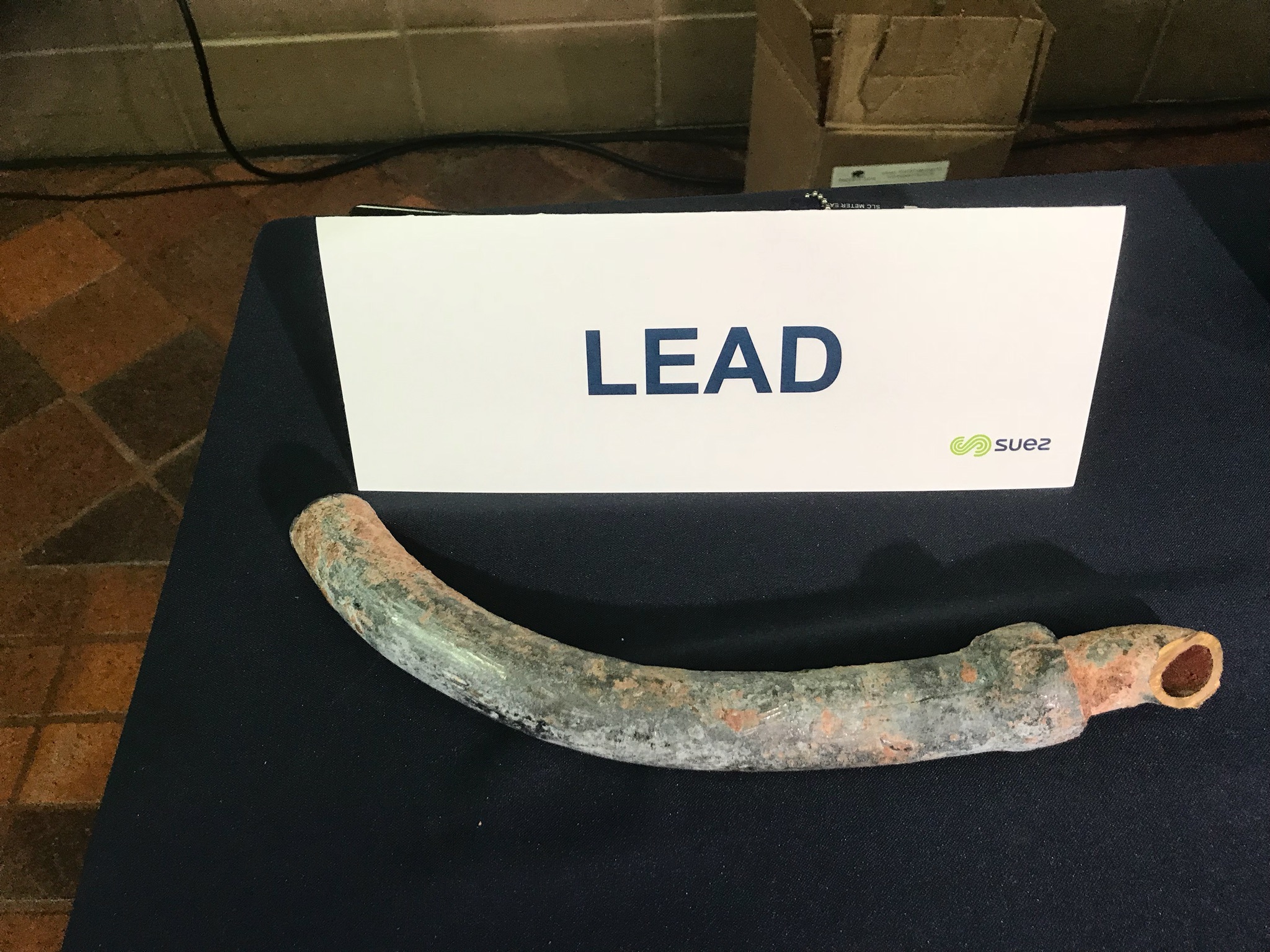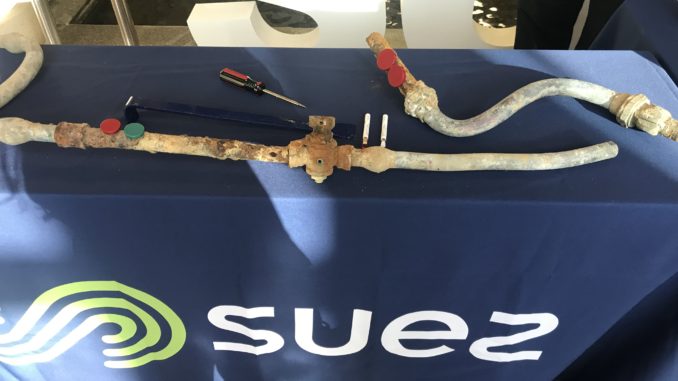
BY MICHAEL OLOHAN AND KATHRYNE MCCANN
HAWORTH, N.J.—Mayors from Pascack Valley and Northern Valley towns said they’re looking for more specifics following a June 11 information session hosted by Suez North America on the utility’s efforts to reduce lead in customers’ drinking water system-wide.
At least one said the work is long overdue. Most said their residents had reached out to them in concern, and all participants we spoke to agreed the utility’s outreach was motivated and welcome.
Tables at the forum, at the Suez Haworth Water Treatment Plant, covered customer support, health impacts, understanding lead, the lead line replacement program, water quality, and lead inside homes.
Residents gathered information about the effects of lead, where it can be found besides drinking water, and what Suez is doing to resolve the issue.
The utility’s chief chemist explained the workings of monitoring stations.
Earlier this year, Suez announced a $15 million expedited lead line replacement program for 2019 to replace a quarter of its lead service lines this year–2,400 of them—after taking heat following its report of high lead level readings in January.
The U.S. Environmental Protection Agency says that there is no safe levels of lead in drinking water and that lead pipes are more likely to be found in homes built before 1986.
Even at low exposure levels lead can be harmful to human health, and overtime can bioaccumulate.
Young children, infants and fetuses are particularly vulnerable to lead. A dose of lead that could significantly affect a child might have little effect on an adult.
According to the United States Environmental Protection Agency, low levels of exposure in children have been linked to central and peripheral nervous system damage, learning disabilities, shorter stature, impaired hearing, and impaired formation and function of blood cells.
For adults, lead exposure can result in cardiovascular effects, increased blood pressure and incidence of hypertension, decreased kidney function, and reproductive problems. In pregnant women lead can lead to reduced growth of the fetus and premature birth.
Suez lists 8,541 lead service lines and 23,623 lead goosenecks—short pipes connecting to a main—in 57 municipalities it serves in Bergen and Hudson counties.
The utility had revealed that 15 of 108 homes tested with lead service lines showed elevated levels of lead in drinking water, above the 15 parts per billion federal standard.
Initially, replacements were focused on Teaneck, Rutherford, Hackensack, Ridgefield Park, Bogota, North Bergen, Union City and West New York.
Other towns Suez said showed “smaller pockets” of lead lines are Alpine, Old Tappan, River Vale, Little Ferry, Wallington, Lodi, and Upper Saddle River.
Suez’s unknown service lines are listed at 7,060; known customer lead service lines at 2,258; and unknown customer lines at 153,155. The utility serves 200,000 residential and business customers.
In April, Suez proposed to the state Board of Public Utilities a customer lead line replacement program. It awaits a hearing date. The proposal would allow the utility to replace a customer’s lead service line for $1,000, if the customer agrees, during replacement of a utility-owned lead line.
Suez said a lead line replacement costs $3,000 to $8,000, and says the difference could be made up by a surcharge all Suez customers would pay.
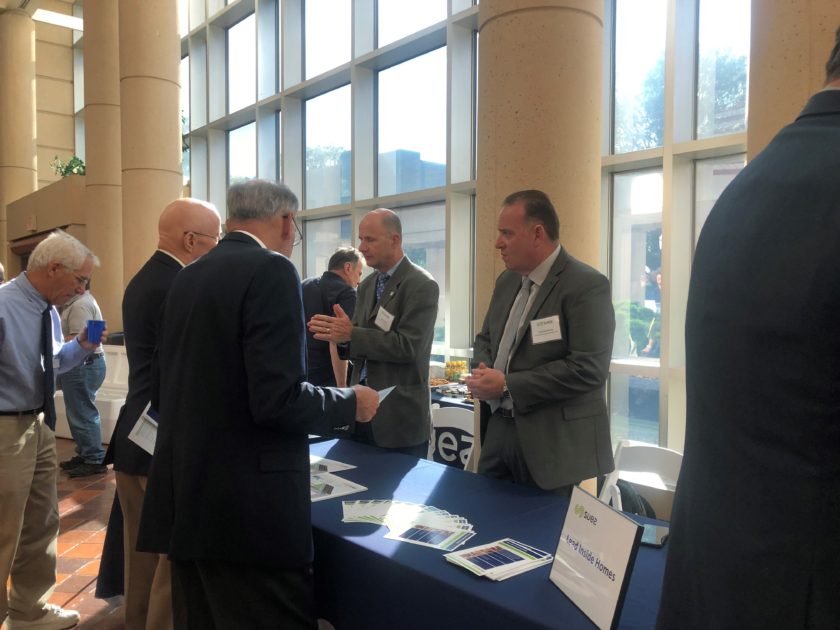
Mayors, residents speak
Mayors from Alpine, Bergenfield, Harrington Park, Westwood, Tenafly, Old Tappan, and Northvale attended an hour-long session prior to a public session June 11.
Fifty individuals—including 35 public officials—visited information tables highlighting lead-related issues, Suez Communications and Community Relations Director Debra Vial told Pascack Press.
Asked their views of the event, most of the mayors who participated told Pascack Press they picked up general information on testing for lead pipes and who was responsible for separate lead service lines.
They agreed they appreciated the opportunity to speak with Suez officials and ask questions.
Several said residents had contacted them about water quality concerns.
Tenafly Mayor Peter Rustin said he did learn some new information and also noted that he was concerned about the utility digging up streets previously paved in town to remove lead service lines.
He said he appreciated that Suez is working with the communities and Bergen County to remove lead lines.
“This is long overdue,” said Rustin, regarding removing and replacing lead service lines. He added he’s fielded “lots of emails” on the issue.
Westwood Mayor John Birkner Jr., a consultant in the wastewater treatment industry and an environmental health specialist for the Bergen County Utilities Authority, said he found the Suez officials “helpful to a certain degree as far as identifying if pipes were lead leading from the street or into the home.”
He said Suez officials told the mayors that most homes built during World War I or World War II do not have lead service lines as the lead was being used for the war effort.
Instead during those periods, galvanized steel was used, he said, which has rusting and corrosion concerns.
Birkner said Suez officials demonstrated a lead-check swab product to confirm whether service lines are lead, noting the swab tip turns red if a pipe is lead.
Birkner said the testing swab is available at major home improvement stores.
Another method Suez recommends: lightly scratching a small area on a pipe with a screwdriver. If the area turns bright or shiny, that indicates a lead pipe.
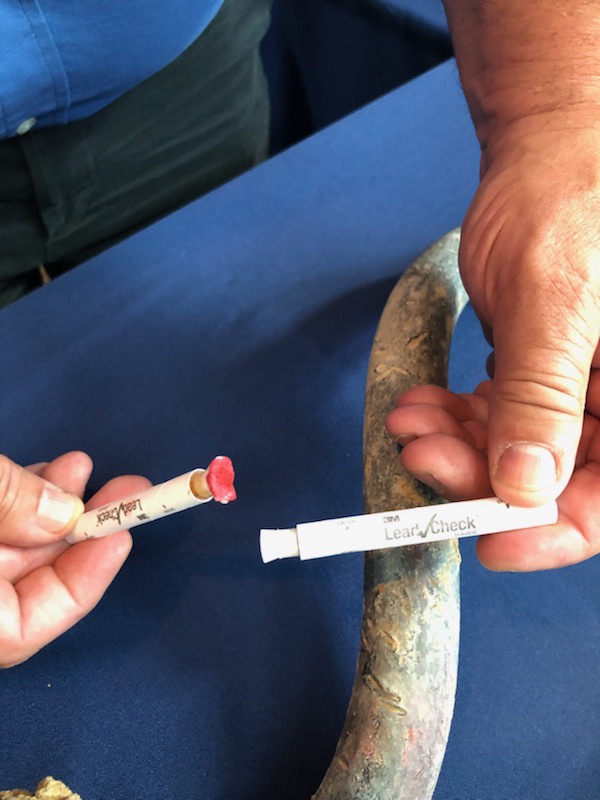
Suez ‘highly motivated’
Alpine Mayor Paul Tomasko said he hoped Suez would work with customers on replacing lead service lines from the curb into their building.
“They appear to be highly motivated and I came away a little better informed,” he said.
Tomasko said Suez emphasized that water leaves its Haworth treatment plant lead-free and the problem begins when the water passes through intermediary lead pipes, which can leach lead through corrosion.
He said he was glad to have met a variety of Suez officials.
“You owe it to your town to do that, getting good contacts,” Tomasko said.
Old Tappan Mayor John Kramer said he picked up a lot of facts for residents, which will be added to the borough website. He said Suez officials at information tables answered all his questions.
“That was valuable and it was worth it,” he said.
Northvale Mayor Patrick Marana said he found the event helpful but noted he’d have preferred a format where public officials could question Suez staff and hear what was going on in other communities.
“I thought that the best thing about the event was the ability to gather a large amount of information in a short period of time,” Marana told Pascack Press.
He said Councilman Lou DeLisio was point person on the lead issue in Northvale and that the town should review Suez materials and develop a concise action plan for residents concerned about lead.
Suez Operations Support Manager Doug Reger said the utility has replaced more than 500 service lines so far.
“We are looking at replacing upwards of 2,500 in order to get that 7% of the lead services removed and we are looking to get 25% of linear footage of lead removed as well,” he said.
Vial said, “What we do here is every time a customer tests high—which haven’t been that many but we are very concerned about that—we send our team to the home of the customer to sit down and talk to them and to go through their homes with them to find what’s happening and help them understand how to fix it, or what we need to do to fix our side.”
Notices are sent out about replacing the lead service lines to property owners at least 60 days in advance, providing residents who also have lead portions time to decide if they would like to have it replaced at the same time as Suez.
Suez is also working with towns to coordinate service line replacement with road paving.
“Suez is holding these sessions because we want our customers to understand lead and what we are doing to ensure clean, safe reliable water. Faucets, pipes and solder inside homes can contain lead. In addition, water softeners that are poorly maintained, the grounding electrical lines to pipes and other things commonly found in homes in the area can cause lead to leach into the water,” Vial said.
“We have undertaken an aggressive effort to replace utility-owned lead service lines and we have leading water quality experts evaluating our already-rigorous corrosion control treatment. We urge customers to take a look inside their homes,” she added.
Montvale lead lines going
Montvale Mayor Michael Ghassali told residents on June 18 that the utility is preparing to replace lead pipes on seven borough streets. Residents should receive notice from the utility on that soon, he said.
“These pipes will be replaced in conjunction with our road paving program this year so newly paved roads are not worked on twice,” Ghassali told Pascack Press.
‘A wealth of information’
A resident from Teaneck said “There was a wealth of information here so I took some information with me and I’ll bring it back to some people I know.
She said of Suez, “They’re really doing great outreach and they are trying very hard to educate the public, which I think is amazing.”
Nereyda DeSoto, also of Teaneck, attended with her daughter, hoping to educate herself on lead levels.
“They’ve been very informative, very helpful. They’ve given me back history on my home and what they’ve done and given me suggestions,” she said.
Gottheimer’s views
On June 18, U.S. Rep. Josh Gottheimer (NJ-5) toured a Suez work site in Dumont and called on the utility to accelerate plans to replace lead service lines and urged Gov. Phil Murphy to enforce state laws requiring annual water testing in schools and publicly release test results.
“Suez has taken the first of what I hope are many [steps] to address this contamination, but to be clear, Brita [water] filters and promises of upgrades to our water pipes aren’t enough,” Gottheimer said in a statement.
“We need to see decisive, long-term action in our communities. We cannot wait while our children and families continue to be exposed to harmful water—in our homes and our schools. We must do everything we can here in North Jersey to ensure our children and families have clean water that’s safe to drink,” he added.
For tips on reducing lead levels in drinking water, visit suezwq.com or write sueznjcustserv@suez-na.com.

